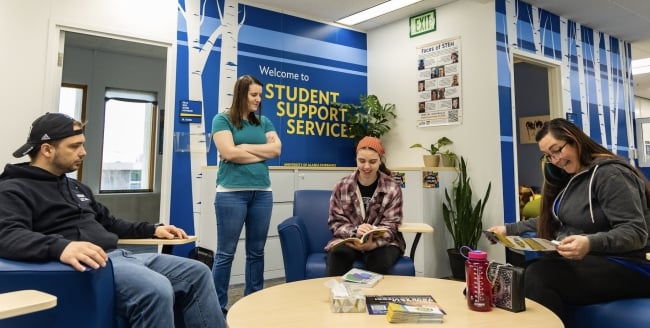You have /5 articles left.
Sign up for a free account or log in.

The University of Alaska at Fairbanks’s TRIO Student Support Services program now has a dedicated counselor for its several hundred students.
TRIO SSS at the University of Alaska at Fairbanks
Federally funded TRIO Student Support Services programs provide intensive, holistic academic advising to low-income, first-generation or disabled students. Increasingly, this means promoting TRIO scholars’ mental health. Yet getting struggling students to schedule and ultimately show up to counseling appointments isn’t easy.
To bridge the gap between need and care, TRIO SSS at the University of Alaska at Fairbanks brought counseling directly to its students this past academic year, in the form of an embedded professional counselor. She’s been booked solid since.
“The stigma and potential mystery surrounding the therapeutic process appears to have decreased significantly as mental health services have become as accessible and commonplace as academic advising services,” says Nikki Baird, the university’s first embedded TRIO SSS counselor. Students “who have been otherwise hesitant to seek mental health services have been encouraged to do so within the comfort of a familiar space and with the endorsement of a trusted organization.”
What’s the need: Victoria Smith, director of the University of Alaska at Fairbanks’s TRIO SSS program, explains that TRIO-eligible students are at elevated risk of mental health issues because they’ve been disproportionately exposed to adversity and trauma in their lives. Add Fairbanks’s near-arctic weather and lack of daylight for much of the year, plus Alaska’s relatively poor climate for youth mental health, and Smith’s advisees are especially vulnerable.
Unfortunately, Smith continues, while students historically have opened up to TRIO advisers about their mental health, too few students have followed through with referrals to attend professional counseling and other wellness services on campus.
“We’ve been trying to triage trauma, and it’s just not sustainable,” Smith recalls.
Then, in 2021, tragedy struck: a student in the program died by suicide while Smith was away leading a regional conference. Although the student had been seeing a counselor, Smith says she immediately resolved to do more to increase student access to care. The moment was “difficult to navigate” but also “activating.”
“Alaska has some of the highest rates of suicide, substance abuse, sexual assault and domestic violence in the nation. We also have the highest proportion nationally of individuals with some college and no credential,” Smith says. “I argue there’s overlap in that Venn diagram, and mental health is at the center, which is why we’re treating mental health services as seriously as financial literacy in this TRIO program.”
How they did it: Smith collaborated with the university’s Student Health and Counseling Center to create the position based in her office. The counseling center, which supervises the counselor, agreed to pay 25 percent of the contract while TRIO SSS pays the rest through federal grants and some institutional funding. The university has a classic TRIO SSS program and one focused on the sciences, technology, math and engineering.
Six counseling sessions per semester is the typical counseling timeline, per university policy. But TRIO SSS students experiencing more acute mental health challenges can exceed this cap if clinically necessary, at no charge. In addition to one-on-one sessions, Baird, the embedded counselor, provides mental health workshops for the TRIO SSS Emerging Scholars Academy during the summer bridge program and throughout the first-year learning community. Mental health–themed craft nights and therapy dogs’ visits take place during the semester, as well.
More benefits: Crucially, Baird also offers a weekly consultation hour for program advisers, to discuss students of concern and to check in with advisers about their own mental health.
TRIO support staff across the country are facing “front-line compassion fatigue and higher rates of burnout,” Smith says, “which is what makes this weekly consultation hour so unique.”
Kimberly Jones, president for the Council for Opportunity in Education, which champions TRIO SSS and similar programs, says that she’s “really proud” of what Smith and her colleagues have been able to achieve. And as TRIO programs nationwide are called to do more to advance student success, advocates are pushing for more funding to support professionals with targeted expertise, including by not limited to mental health.
“We are doing all this already, but in order to do it really effectively, we need to have people on our teams who are trained specialists, whether it’s a nurse, a social worker, a mental health counselor,” Jones says.
Tell us about an innovative aspect of a student success initiative on your campus. Share here.





